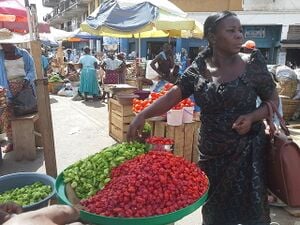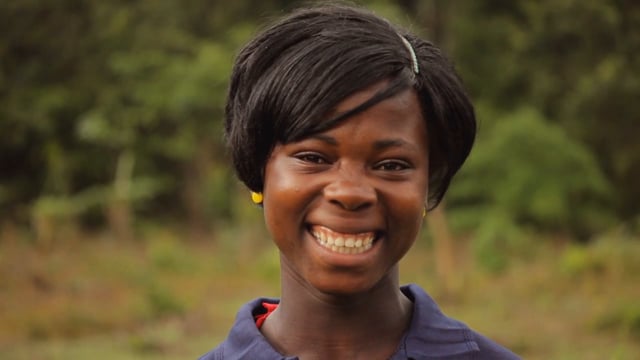
Ghana, officially the Republic of Ghana, is a country in West Africa. It abuts the Gulf of Guinea and the Atlantic Ocean to the south, sharing a border with Ivory Coast in the west, Burkina Faso in the north, and Togo in the east. Ghana covers an area of 239,567 km2 (92,497 sq mi), spanning diverse biomes that range from coastal savannas to tropical rainforests. With over 32 million inhabitants, Ghana is the second-most populous country in West Africa. The capital and largest city is Accra; other significant cities include Kumasi, Tamale, and Sekondi-Takoradi.
The earliest kingdoms to emerge in Ghana were the Kingdom of Dagbon in the north and the Bono state in the south, with the Bono state existing in the area during the 11th century. The Ashanti Empire and other Akan kingdoms in the south emerged over the centuries. Beginning in the 15th century, the Portuguese Empire, followed by other European powers, contested the area for trading rights, until the British ultimately established control of the coast by the 19th century. Following over a century of colonial resistance, the current borders of the country took shape, encompassing four separate British colonial territories: Gold Coast, Ashanti, the Northern Territories, and British Togoland. These were unified as an independent dominion within the Commonwealth of Nations. On 6 March 1957, Ghana became the first country in Sub-Saharan Africa to achieve sovereignty. Ghana subsequently became influential in decolonisation efforts and the Pan-African movement.
Networks and sustainability initiatives[edit | edit source]
Climate action[edit | edit source]
Ghana signed the Paris Agreement on 22 April 2016 and ratified it on 21 September 2016. The first national climate change adaptation strategy in Ghana was developed to be implemented between 2010 and 2020. Adaptation seeks to lower the risks posed by the consequences of climate change. Adaptation measures may be planned in advance or put in place spontaneously in response to local pressure such as afforestation, land rotation, building climate-resilient structures, solar-powered infrastructure, etc. The Ministry of Environment Science, Technology and Innovation published a policy framework in 2013.
In 2015, Ghana developed a framework entitled "Ghana's Intended Nationally Determined Contribution" to outline a plan to reduce carbon emissions and to improve eternity of land use, transportation, and other economic and societal sectors. This plan after the Paris Agreement in 2016 became the Nationally Determined Contribution (NDCs).
Ghana still needs to develop long-term contingency plans for dealing with climate change as local managers seem to have an inadequate perception of the costs of dealing with such crises.
Climate change in Ghana is impacting the people in Ghana in several ways as the country sits at the intersection of three hydro-climatic zones. Changes in rainfall, weather conditions and sea-level rise will affect the salinity of coastal waters. This is expected to negatively affect both farming and fisheries.
Sustainable livelihood[edit | edit source]
Trees, woodland and forest[edit | edit source]
On 11 June 2021, Ghana inaugurated Green Ghana Day in an aim of planting 5 million trees in a concentrating effort to preserve the country's cover of rainforest to combat deforestation. W
Community energy[edit | edit source]
News and comment[edit | edit source]
2010
2010 SEED Award Winners,[1] November 3
"The Shea Economic Empowerment Program (SEEP)". This fruitful partnership centred on a community-based cooperative and international NGOs seeks to improve the livelihoods of women Shea nut producers by offering training, greater ownership within the supply chain and access to improved technology.
"G-lish: Income Generation, Re-Generation, Next Generation". The aim of this remarkable initiative of local NGOs is to provide value-added income for rural communities by crafting baskets from recycled materials. In doing so, they preserve the age-old basket-weaving tradition and carry out extensive tree-planting operations.
"High-value Syrup from 'Prekese' Fruits for Community Livelihood Empowerment". Relying on local raw materials, the partners of this promising initiative strive to establish the sustainable cultivation and harvesting of Prekese fruits in rural communities, allowing income to be generated over the whole life cycle of the tree.
"Ghana Bamboo Bikes Initiative" is a youth-led, non-profit enterprise committed to the economic empowerment of youth by taking advantage of the abundant bamboo raw materials in Ghana to manufacture and assemble high-quality bamboo bikes - suitable for the road conditions and terrain in Ghana and affordable to the poor.
"DeCo! - Decentralized Composting for Sustainable Farming and Development". The composting firm DeCO! benefits local farmers by producing organic fertiliser in decentralised composting plants following a low-tech approach. By working with local NGOs, government and research institutes, DeCO! aims to inform and educate farmers about the advantages of sustainable soil management.
"Biofuel Production in Promoting Sustainable Land Management". A local NGO in partnership with national research institutions has established a model for rehabilitating degraded community lands, producing food crop and utilising renewable energy through the cultivation and processing of sunflower plants into oil and biodiesel. Their sustainable land management approach also includes bee-keeping.
External links[edit | edit source]
Wikipedia: Ghana


